|
|
|
Sort Order |
|
|
|
Items / Page
|
|
|
|
|
|
|
| Srl | Item |
| 1 |
ID:
114998
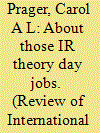

|
|
|
|
|
| Publication |
2011.
|
| Summary/Abstract |
Chris Brown's invitation in 'IR Theory in Britain - the New Black?' to consider whether theory's pre-eminence in British IR is warranted appears to have gone unheeded. He asks whether the consuming preoccupation with theory can be justified or will turn out to be as transitory as the 'new black' soon to be supplanted by the next 'new black'. There are many possible explanations for the neglect of Brown's views, but whatever the reason, epistemology can provide some answers. It draws attention to the applied aspect of IR theory as well as the nature of theory's relations with the rest of the discipline, buttressing Brown's arguments to this effect. I go further to ask whether theory's place is not ultimately best seen as one element in an approach not unlike classical redux.
|
|
|
|
|
|
|
|
|
|
|
|
|
|
|
|
| 2 |
ID:
114990
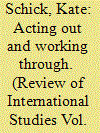

|
|
|
|
|
| Publication |
2011.
|
| Summary/Abstract |
Trauma, the silenced aftermath of violence, has been largely neglected by international security studies, which perceives trauma as having little relevance to global politics. However, this article contends that trauma profoundly influences global security. Unless traumatic events are worked through, they can heighten insecurity not only in the immediate aftermath of violence but decades and even generations later. The article is divided into three parts. The first section examines trauma in general terms, noting its individual, social and political dimensions. The second section examines acting out in response to trauma, with a particular focus on the meaning-making narratives adopted in order to make sense of traumatic experiences: the heroic soldier, good and evil, and redemptive violence. These narratives serve to secure the state by shutting down questioning and showing strength and decisiveness in the wake of traumatic shocks. Section three examines the notion of working through trauma. Working through involves a process of mourning, in which past atrocities are acknowledged, reflected on, and more fully understood in all their historically situated complexity. It is a deeply political process that struggles to understand and challenge those structures and practices that facilitate traumatic loss.
|
|
|
|
|
|
|
|
|
|
|
|
|
|
|
|
| 3 |
ID:
114996
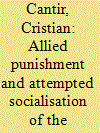

|
|
|
|
|
| Publication |
2011.
|
| Summary/Abstract |
This article makes theoretical and empirical contributions to the recent literature on the socialisation and punishment of state and non-state actors. First, it argues that the English School can add significantly to our understanding of the socialisation and punishment processes because of the theory's emphasis on great powers as 'custodians' of the society of states. Second, it analyses the policies of the United Kingdom, France, and, to a lesser degree, a number of other powers toward the Bolsheviks and the Whites during the Civil War and beyond (1917-1924). The basic argument is that London, Paris, and other capitals acted like 'guardians' of the society of states in their attempt to punish and socialise the participants in the Civil War.
|
|
|
|
|
|
|
|
|
|
|
|
|
|
|
|
| 4 |
ID:
114985
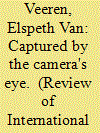

|
|
|
|
|
| Publication |
2011.
|
| Summary/Abstract |
In January 2002, images of the detention of prisoners held at US Naval Station Guantanamo Bay as part of the Global War on Terrorism were released by the US Department of Defense, a public relations move that Secretary of Defense Donald Rumsfeld later referred to as 'probably unfortunate'. These images, widely reproduced in the media, quickly came to symbolise the facility and the practices at work there. Nine years on, the images of orange-clad 'detainees' - the 'orange series' - remain a powerful symbol of US military practices and play a significant role in the resistance to the site. However, as the site has evolved, so too has its visual representation. Official images of these new facilities not only document this evolution but work to constitute, through a careful (re)framing (literal and figurative), a new (re)presentation of the site, and therefore the identities of those involved. The new series of images not only (re)inscribes the identities of detainees as dangerous but, more importantly, work to constitute the US State as humane and modern. These images are part of a broader effort by the US administration to resituate its image, and remind us, as IR scholars, to look at the diverse set of practices (beyond simply spoken language) to understand the complexity of international politics.
|
|
|
|
|
|
|
|
|
|
|
|
|
|
|
|
| 5 |
ID:
115001
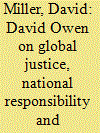

|
|
|
| 6 |
ID:
114977


|
|
|
|
|
| Publication |
2011.
|
| Summary/Abstract |
In this article, I investigate the processes of the discursive construction of the identity of Kazakhstan as a sovereign and non-nuclear state, and show how the construction and performance of these identities are both productive and the product of Nuclear Weapons Technology (NWT) as a threat to the national security of Kazakhstan. I argue that both practices - the production of the state identity and the abolition of the ex-Soviet nuclear arsenal from the territory of Kazakhstan - are instrumental ways to secure the values of Kazakhstan, in this case the existence of Kazakhstan as a sovereign state.
|
|
|
|
|
|
|
|
|
|
|
|
|
|
|
|
| 7 |
ID:
114976


|
|
|
|
|
| Publication |
2011.
|
| Summary/Abstract |
Non-state entities that aspire to statehood are increasingly developing democratic norms and practices, in part to enhance their claims for independence. However, the prospects for democracy in cases of 'problematic sovereignty' are little understood. This article seeks to explore the important but under-explored relationship between sovereignty and democracy, and in particular to assess the extent to which sovereignty is, or is not, a prerequisite for democracy. The article advances two arguments. First, it argues that there is no clear-cut relationship between sovereignty and democracy, as sovereignty is a complex concept that is comprised of several important, and distinct, constituent elements. Second, the article argues that the legal recognition of statehood (international legal sovereignty) is of marginal importance in this area, and should not be seen as a necessary condition for democratic rule. The article examines the process of democratic transition in the non-state entity of Somaliland to provide empirical support.
|
|
|
|
|
|
|
|
|
|
|
|
|
|
|
|
| 8 |
ID:
114997
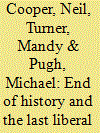

|
|
|
|
|
| Publication |
2011.
|
| Summary/Abstract |
In the April 2010 Review of International Studies, Roland Paris argued that liberal peacebuilding is the only viable solution for rebuilding war-torn societies, and supported this by assailing critics of the liberal peace. In this article we challenge four key claims made by Paris: imposed and consensual peacebuilding are different experiences; there are no echoes of imperialism in modern peacebuilding; there is no alternative to the capitalist free market; and critics of the liberal peace are 'closet liberals'. We argue that Paris ignores the extent to which all peacebuilding strategies have had a core of common prescriptions: neoliberal policies of open markets, privatisation and fiscal restraint, and governance policies focused on enhancing instruments of state coercion and 'capacity building' - policies that have proved remarkably resilient even while the democracy and human rights components of the liberal peace have been substantially downgraded. There is little space to (formally) dissent from these policy prescriptions - whether international peacebuilders were originally invited in or not. Furthermore, the deterministic assumption by Paris that 'there is no alternative' is unjustifiable. Rather than trying to imagine competing meta-alternatives to liberalism, it is more constructive to acknowledge and investigate the variety of political economies in post-conflict societies rather than measuring them against a liberal norm.
|
|
|
|
|
|
|
|
|
|
|
|
|
|
|
|
| 9 |
ID:
114992


|
|
|
|
|
| Publication |
2011.
|
| Summary/Abstract |
This article examines the origins of American neo-conservatism by assessing the contributions of one of its less known inspirations, James Burnham. In charting Burnham's political philosophies and various contemporary reactions to them, this article examines his legacy as it relates to the movement, specifically in his approach to foreign affairs and institutions. It argues that he was more a pioneer than is often acknowledged. In so doing this article also corrects misunderstandings that have arisen in critiques of neo-conservatism, suggesting that Burnham's oeuvre may offer more instructive guidance than some of his contemporaries in understanding the neo-conservative revolution in American foreign policy.
|
|
|
|
|
|
|
|
|
|
|
|
|
|
|
|
| 10 |
ID:
114999
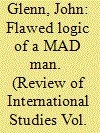

|
|
|
|
|
| Publication |
2011.
|
| Summary/Abstract |
In a recent issue of this journal Campbell Craig put forward an amended version of Power Preponderance theory seeking to explain why US unipolar predominance has turned out to be not simply a 'moment' and as such represents 'a serious anomaly for neorealist theory'. In using Waltz's own work on how nuclear weapons affect state behaviour, Craig appears to further bolster the case for Power Preponderance theory. Craig exploits what at first sight seems to be a contradiction in Waltz's work. However, Craig's error is that he treats security qua territorial security rather than considering a more encompassing view of state security. In the arena of 'secondary' security issues the usual logic of counter-balancing with conventional military forces still holds sway. This reply argues that a balance of power will return to the international system, it is just that at this moment no country or coalition of countries is quite up to the task.
|
|
|
|
|
|
|
|
|
|
|
|
|
|
|
|
| 11 |
ID:
114983


|
|
|
|
|
| Publication |
2011.
|
| Summary/Abstract |
Norman Angell's The Great Illusion, which ran through six versions in London between November 1909 and December 1938, has some claim to have launched International Relations as a self-consciously independent yet sub-consciously liberal discipline. Understood to argue primarily that the interlocking fragility of the international financial system stopped modern states profiting from aggression, its ideas were promoted by a specially created foundation as 'the science of international politics' or 'international polity'. Since the 1970s, moreover, the book has been credited by scholars with pioneering the concepts of interdependence and globalisation. Now, therefore, it is less its seminal qualities than its fundamental flaws that require emphasis. Its celebrated claim about the irenic implications of financial interdependence was widely misunderstood as implying the impossibility, in addition to the disutility, of aggression. And a little-noticed second argument - that political control over territory brought no substantive benefits - was not only implausible but inconsistent with Angell's declared opposition to cuts in arms spending. The Great Illusion's policy recommendations were thus ambiguous, and altered from edition to edition as its author grappled first with the contradiction between pacifist and pro-defence strands in his thinking and then with the changing international situation.
|
|
|
|
|
|
|
|
|
|
|
|
|
|
|
|
| 12 |
ID:
114974
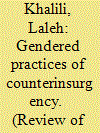

|
|
|
|
|
| Publication |
2011.
|
| Summary/Abstract |
Current US counterinsurgency doctrine is gendered diversely in the different geographic locations where it is formulated, put in practice, and experienced. Where Iraqi and Afghan populations are subjected to counterinsurgency and its attendant development policy, spaces are made legible in gendered ways, and people are targeted - for violence or 'nation-building' - on the basis of gender-categorisation. Second, this gendering takes its most incendiary form in the seam of encounter between counterinsurgent foot-soldiers and the locals, where sexuality is weaponised and gender is most starkly cross-hatched with class and race. Finally, in the Metropole, new masculinities and femininities are forged in the domain of counterinsurgency policymaking: While new soldier-scholars represent a softened masculinity, counterinsurgent women increasingly become visible in policy circles, with both using ostensibly feminist justifications for their involvement.
|
|
|
|
|
|
|
|
|
|
|
|
|
|
|
|
| 13 |
ID:
114994
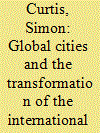

|
|
|
|
|
| Publication |
2011.
|
| Summary/Abstract |
The emergence of a new urban form, the global city, has attracted little attention from International Relations (IR) scholars, despite the fact that much progress has been made in conceptualising and mapping global cities and their networks in other fields. This article argues that global cities pose fundamental questions for IR theorists about the nature of their subject matter, and shows how consideration of the historical relationship between cities and states can illuminate the changing nature of the international system. It highlights how global cities are essential to processes of globalisation, providing a material and infrastructural backbone for global flows, and a set of physical sites that facilitate command and control functions for a decentralised global economy. It goes on to argue that the rise of the global city challenges IR scholars to consider how many of the assumptions that the discipline makes about the modern international system are being destabilised, as important processes deterritorialise at the national level and are reconstituted at different scales.
|
|
|
|
|
|
|
|
|
|
|
|
|
|
|
|
| 14 |
ID:
114978


|
|
|
|
|
| Publication |
2011.
|
| Summary/Abstract |
Over the last two decades, there has been a 'democratic turn' in peace and conflict research, that is, the peculiar impact of democratic politics on a wide range of security issues has attracted more and more attention. Many of these studies are inspired by Immanuel Kant's famous essay on 'Perpetual Peace'. In this article, we present a critical discussion of the 'democratic distinctiveness programme' that emerged from the Democratic Peace debate and soon spread to cover a wider range of foreign policy issues. The bulk of this research has to date been based on an overly optimistic reading of a 'Kantian peace'. In particular, the manifold forms of violence that democracies have exerted, have been treated either as a challenge to the Democratic Peace proposition or as an undemocratic contaminant and pre-democratic relict. In contrast, we argue that forms of 'democratic violence' should no longer be kept at arm's length from the democratic distinctiveness programme but instead should be elevated to a main field of study. While we acknowledge the benefits of this expanding research programme, we also address a number of normative pitfalls implied in this scholarship such as lending legitimacy to highly questionable foreign policy practices by Western democracies. We conclude with suggestions for a more self-reflexive and 'critical' research agenda of a 'democratically turned' peace and conflict studies, inspired by the Frankfurt school tradition.
|
|
|
|
|
|
|
|
|
|
|
|
|
|
|
|
| 15 |
ID:
114979
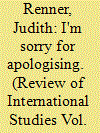

|
|
|
|
|
| Publication |
2011.
|
| Summary/Abstract |
This article inquires into the effects of public apologies. It argues that the focus of most scholars of public diplomacy or conflict resolution on the conflict solving capacity of public apologies is limited and prevents an open and responsive analysis of empirical apology processes. Drawing on speech act theory as developed by John L. Austin and some of his critics it suggests that existing apology theory should broaden its perspective and also take the perlocutionary, that is, the unintended social effects of public apologies into account. The article illustrates its theoretical argument with the example of the Czech-German apology process. The apologies issued between these countries since 1989 suggest that the conflict solving performance of the apologies was exceeded by the unintended social consequences in both, the apologising country as well as the country receiving the apology.
|
|
|
|
|
|
|
|
|
|
|
|
|
|
|
|
| 16 |
ID:
114995
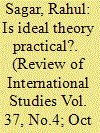

|
|
|
|
|
| Publication |
2011.
|
| Summary/Abstract |
This article examines how the exemplars of ideal theory have addressed what I term 'the problem of preservation'. The 'problem' in question is not so much that a political community must make provisions for its self-preservation, but rather that its provisions must correspond to the intentions and capabilities of its neighbours. This constraint implies that the ability of a political community to pursue ideals rather than power depends heavily on who its neighbours happen to be. This article shows how Aristotle, Rousseau, Kant, and Rawls address this problem by recommending measures such as defensive fortification, collective security, and democratic peace, which, they claim, will dampen the anarchic nature of the international system. It argues that the implausibility of these measures renders the ability of political communities to heed the moral guidance offered by ideal theory contingent at best and impractical at worst. If proponents of ideal theory wish to resist this conclusion, then they must offer a more persuasive answer to the problem of preservation.
|
|
|
|
|
|
|
|
|
|
|
|
|
|
|
|
| 17 |
ID:
114986
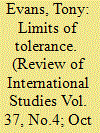

|
|
|
|
|
| Publication |
2011.
|
| Summary/Abstract |
Following recent acts of terrorism in many parts of the world, Islam has become an object of fear. While the threat of violence is undoubtedly an element that inspires this fear, Islam's counter-hegemonic threat is not limited to violence alone. Given its 1.2 billion following, Islam also offers a challenge to the central values that describe the dominant neo-liberal world order, particularly those values that legitimate the global political economy. Although tolerance is an important value in liberal thought, tolerance cannot be exercised where counter-hegemonic threats include challenges to the central tenets of liberalism. This article argues that the current fear of Islam is motivated by just such a challenge. By looking at four central concepts where liberal and Islamic thought diverge - reason and revelation, private property, rights and duties, and government and state - this article seeks to gain a more nuanced insight into current attitudes towards Islam and the fear of counter-hegemony.
|
|
|
|
|
|
|
|
|
|
|
|
|
|
|
|
| 18 |
ID:
114987


|
|
|
|
|
| Publication |
2011.
|
| Summary/Abstract |
The quest for perpetual peace is a modern phenomenon, associated with a progressive view of history which emerged only in the Enlightenment. In addition, boredom - a feeling of ennui associated with a loss of the ability to act - is a fundamental mood of the modern age. Modern societies are thus, simultaneously, becoming more peaceful and their inhabitants are becoming more bored. As a means of overcoming our boredom, we are increasingly fascinated by violence, and war is glorified as a means of restoring our ability to act. Empirical illustrations of this thesis are drawn from World War I and from the Bush administration's 'global War on Terror'.
|
|
|
|
|
|
|
|
|
|
|
|
|
|
|
|
| 19 |
ID:
114988
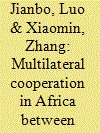

|
|
|
|
|
| Publication |
2011.
|
| Summary/Abstract |
In the 21st century, it is a great event in the field of international politics that both China and Africa are marching towards revival and more cooperation among each other. The old international order which centered on the West can no longer meet the demand of the changes of African geopolitical pattern. Therefore, it is high time to establish a multilateral cooperation mechanism concerning Africa's peace and development. The authors argue that there are differences in historical experience, diplomatic ideas and principles as well as extensive common grounds of diplomatic strategy and national interests between China and the West in respect of their relations with Africa. Both China and the West should promote talks which are more open, more cooperative and more conducive to a win-win end. In doing this, they can achieve a win-for-all result for all the parties involved.
|
|
|
|
|
|
|
|
|
|
|
|
|
|
|
|
| 20 |
ID:
114975
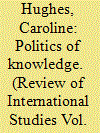

|
|
|
|
|
| Publication |
2012.
|
| Summary/Abstract |
A new casting of diasporas, exiles and returnees as potentially transformative agents in post-conflict polities is the topic of this article. 'Return of Qualified Expatriates' programmes have recently been launched by international agencies in a number of post-conflict countries in an attempt to promote better capacity-building within post-conflict states institutions. This article argues that the ostensible technical orientation of these programmes is misleading, and they have a political significance which is noted and contested locally. In political terms, they represent attempts to smuggle Western hierarchies of knowledge into post-conflict reconstruction efforts under the cover of ethnic solidarity, to the detriment of local participation and empowerment. The article argues further that this is always contested by interested parties locally, often by mobilising alternative capacities, labelled 'authentic', in opposition. As such, strategies that attempt to use ethnic ties to overcome this local contestation are placing a significant burden on ethnic categories that are slippery, malleable and contested in post-conflict contexts. These points are demonstrated with reference to the cases of Cambodia and Timor-Leste.
|
|
|
|
|
|
|
|
|
|
|
|
|
|
|
|
|
|
|
|
|